Unit 2 I think that mooncakes are delicious! 单元综合课件(共20张PPT,内嵌音视频) 人教版英语九年级全册
文档属性
| 名称 | Unit 2 I think that mooncakes are delicious! 单元综合课件(共20张PPT,内嵌音视频) 人教版英语九年级全册 |
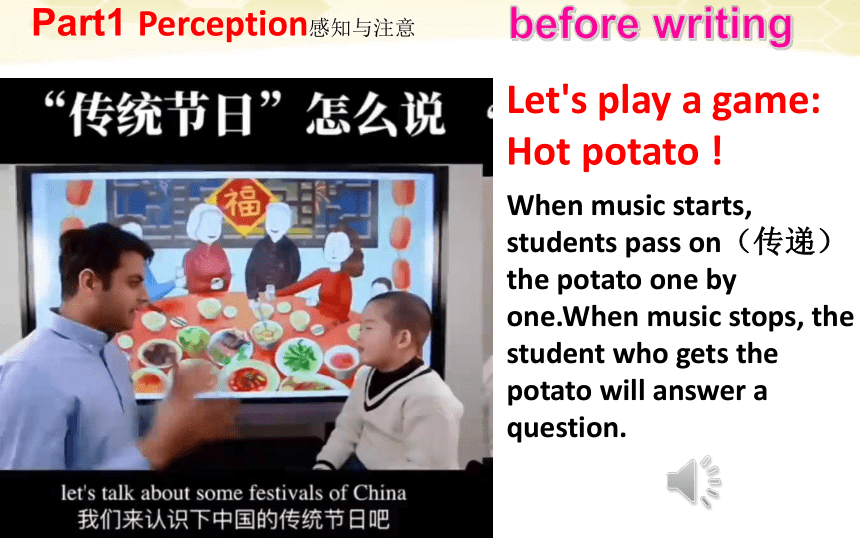
|
|
| 格式 | pptx | ||
| 文件大小 | 6.2MB | ||
| 资源类型 | 教案 | ||
| 版本资源 | 人教新目标(Go for it)版 | ||
| 科目 | 英语 | ||
| 更新时间 | 2024-10-08 00:00:00 | ||
图片预览

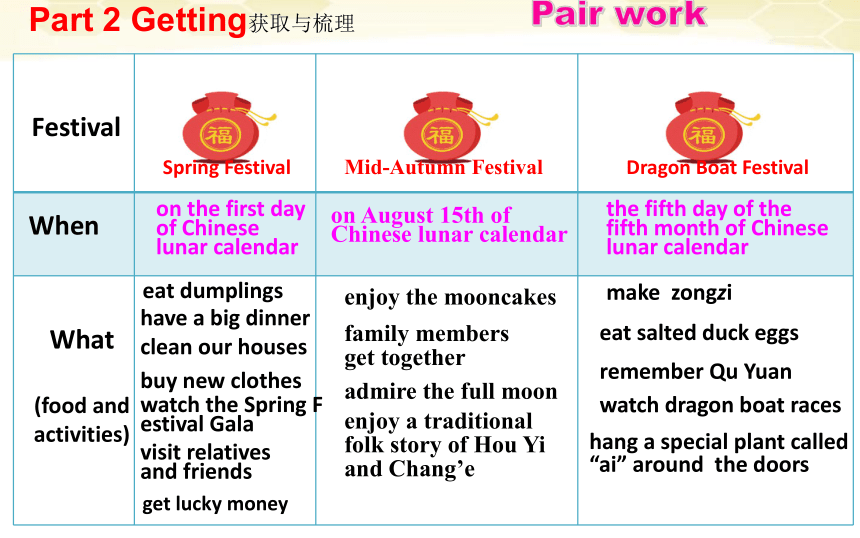
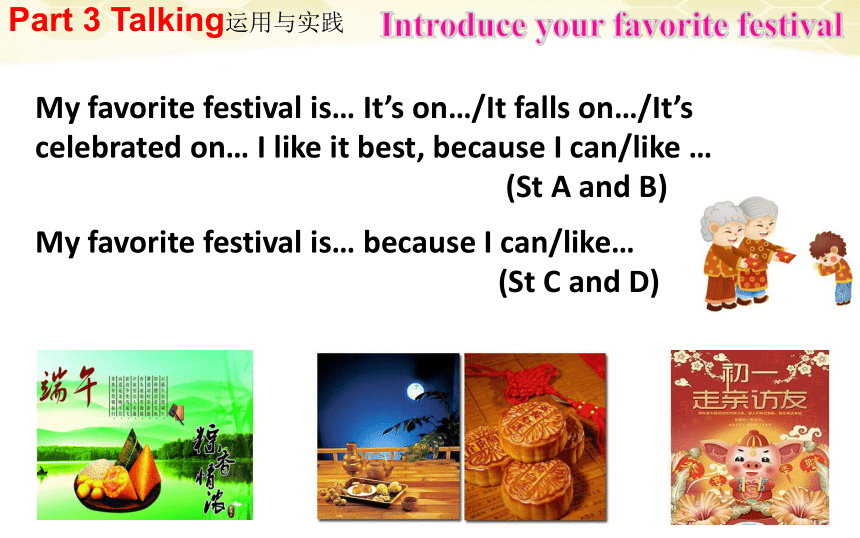
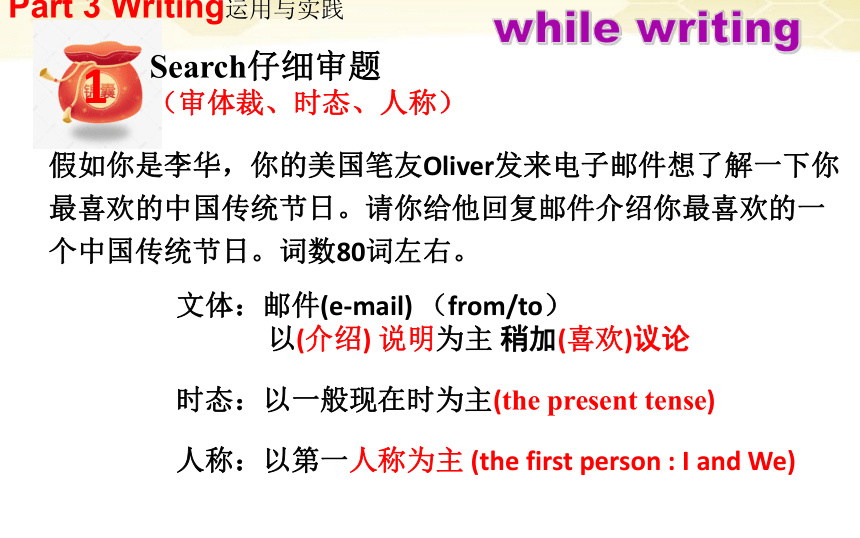
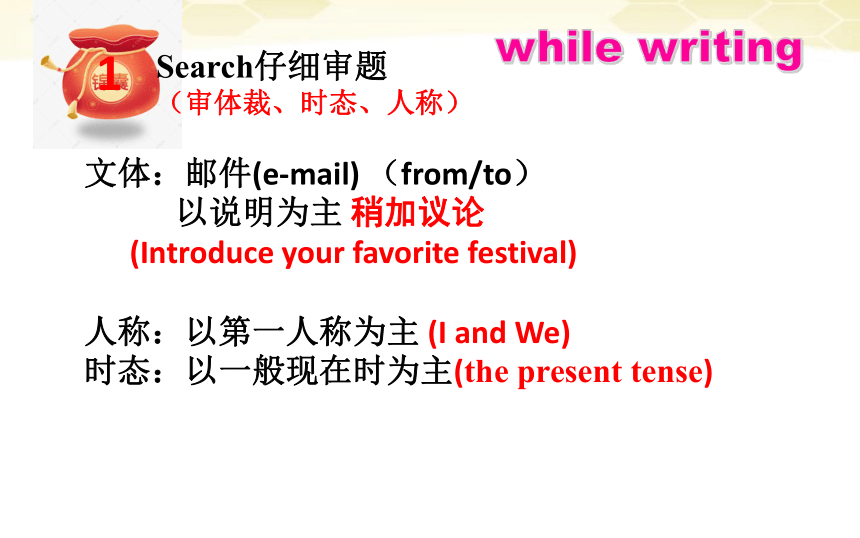
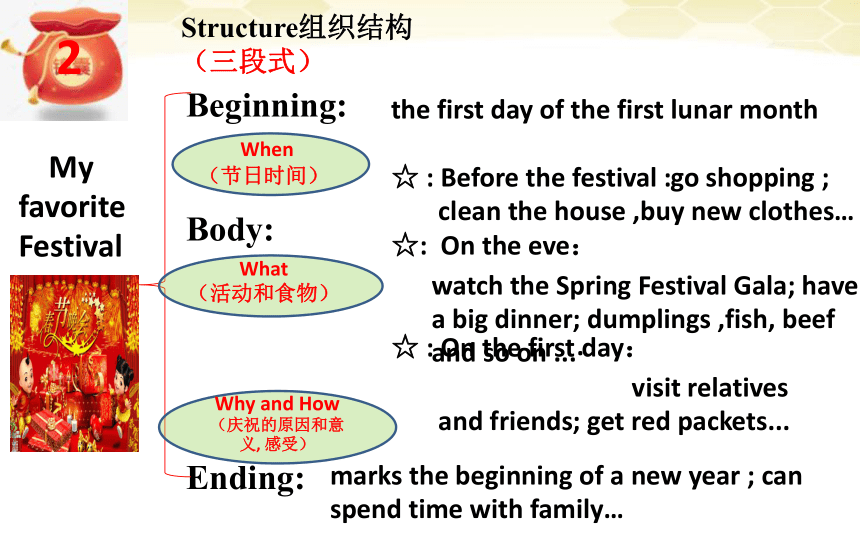
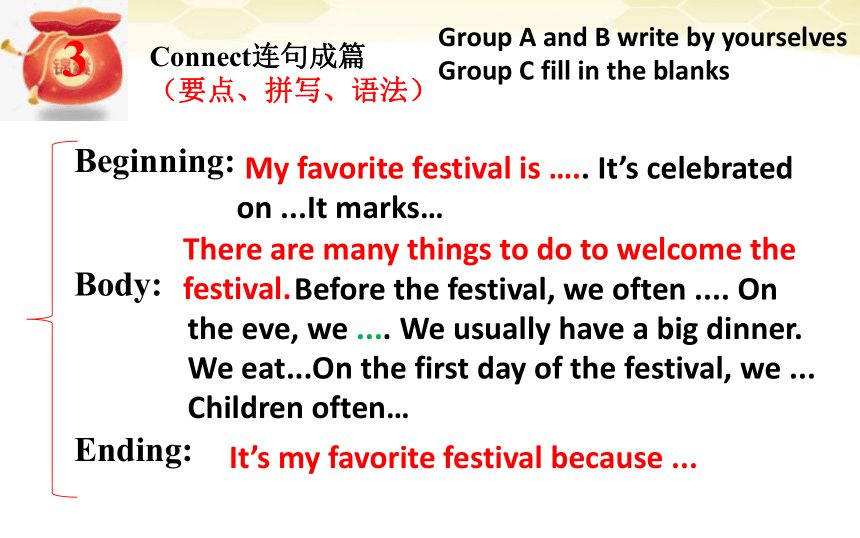
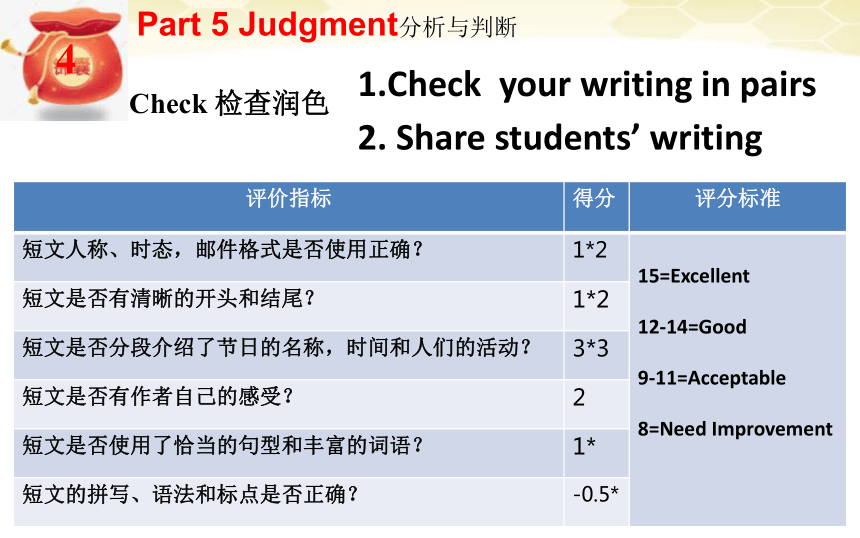
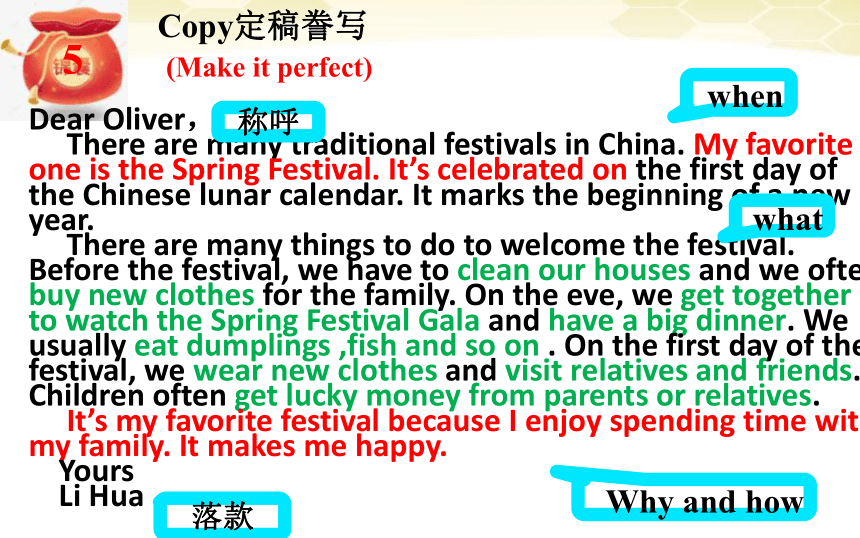
文档简介
(共20张PPT)
Part1 Perception感知与注意
Let's play a game:
Hot potato !
When music starts, students pass on(传递) the potato one by one.When music stops, the student who gets the potato will answer a question.
before writing
Festival
Spring Festival
Mid-Autumn Festival
Dragon Boat Festival
When
What
(food and
activities)
the fifth day of the
fifth month of Chinese lunar calendar
on the first day
of Chinese
lunar calendar
on August 15th of
Chinese lunar calendar
clean our houses
buy new clothes
have a big dinner
watch the Spring Festival Gala
visit relatives and friends
get lucky money
admire the full moon
enjoy the mooncakes
watch dragon boat races
enjoy a traditional
folk story of Hou Yi
and Chang’e
family members
get together
remember Qu Yuan
make zongzi
eat salted duck eggs
hang a special plant called “ai” around the doors
Part 2 Getting获取与梳理
eat dumplings
Pair work
Part 3 Talking运用与实践
My favorite festival is… It’s on…/It falls on…/It’s celebrated on… I like it best, because I can/like …
(St A and B)
My favorite festival is… because I can/like…
(St C and D)
Introduce your favorite festival
Search仔细审题
(审体裁、时态、人称)
时态:以一般现在时为主(the present tense)
while writing
1
假如你是李华,你的美国笔友Oliver发来电子邮件想了解一下你最喜欢的中国传统节日。请你给他回复邮件介绍你最喜欢的一个中国传统节日。词数80词左右。
Part 3 Writing运用与实践
文体:邮件(e-mail) (from/to)
以(介绍) 说明为主 稍加(喜欢)议论
人称:以第一人称为主 (the first person : I and We)
Search仔细审题
(审体裁、时态、人称)
文体:邮件(e-mail) (from/to)
以说明为主 稍加议论
(Introduce your favorite festival)
人称:以第一人称为主 (I and We)
时态:以一般现在时为主(the present tense)
1
while writing
Structure组织结构
(三段式)
Beginning:
Body:
Ending:
2
My
favorite
Festival
What
(活动和食物)
When
(节日时间)
Why and How
(庆祝的原因和意义, 感受)
the first day of the first lunar month
☆ : Before the festival :
☆: On the eve:
☆ : On the first day:
go shopping ;
clean the house ,buy new clothes…
visit relatives
and friends; get red packets...
watch the Spring Festival Gala; have a big dinner; dumplings ,fish, beef and so on ...·
marks the beginning of a new year ; can spend time with family…
Connect连句成篇
(要点、拼写、语法)
It’s my favorite festival because ...
Beginning:
Body:
Ending:
My favorite festival is ….. It’s celebrated
on ...It marks…
There are many things to do to welcome the
festival.
3
Before the festival, we often .... On the eve, we .... We usually have a big dinner. We eat...On the first day of the festival, we ... Children often…
Group A and B write by yourselves
Group C fill in the blanks
Check 检查润色
4
Check your writing in pairs
2. Share students’ writing
评价指标 得分 评分标准
短文人称、时态,邮件格式是否使用正确? 1*2
15=Excellent
12-14=Good
9-11=Acceptable
8=Need Improvement
短文是否有清晰的开头和结尾? 1*2
短文是否分段介绍了节日的名称,时间和人们的活动? 3*3
短文是否有作者自己的感受? 2
短文是否使用了恰当的句型和丰富的词语? 1*
短文的拼写、语法和标点是否正确? -0.5*
Part 5 Judgment分析与判断
Copy定稿誊写
(Make it perfect)
5
Dear Oliver,
There are many traditional festivals in China. My favorite one is the Spring Festival. It’s celebrated on the first day of the Chinese lunar calendar. It marks the beginning of a new year.
There are many things to do to welcome the festival. Before the festival, we have to clean our houses and we often buy new clothes for the family. On the eve, we get together to watch the Spring Festival Gala and have a big dinner. We usually eat dumplings ,fish and so on . On the first day of the festival, we wear new clothes and visit relatives and friends. Children often get lucky money from parents or relatives.
It’s my favorite festival because I enjoy spending time with my family. It makes me happy.
Yours
Li Hua
when
称呼
落款
what
Why and how
假如你校英语报“Festival Stories”栏目面向全校学生征稿。请你根据以下提示要点,写一篇英语短文介绍令你印象深刻的一次节日经历,并投稿。词数80词左右。
要点提示 :1.该节日的名称;
2.你是如何度过这一节日的;
3.你的感受或收获。
Part 6 Creation迁移与创新
审题
(search)
体裁:
要点:
时态:
人称:
2 .what you did on that day
1 .what the festival is
3 .your feelings
the past tense and the present tense
the first person
以记叙为主,稍加议论。
after writing
As one of the most popular traditional festivals in China, the Mid-Autumn Festival is a great time for families to get together.
I still remember my family members getting together and eating mooncakes last year. There were different kinds of delicious mooncakes during the festival. On the evening of the Mid-Autumn Festival, we got together and admired the full moon in the dark sky. My grandpa is good at telling stories. On that night, he told us a traditional folk story of Hou Yi and Chang’e. And then, We talked with my grandma and we sang songs together till very late. All of my family had a great time, especially my grandparents.
The experience made me realize that everyone should spend more time with their families, especially with the elders.
课文解析
1. Chinese people have been celebrating Mid-Autumn Festival and enjoying mooncakes for centuries. 中国人数百年来欢度中秋佳节, 享受美味月饼。
这是现在完成进行时,表示动作从某一时间开始,一直持续到现在。其构成为:主语+助动词(have / has) + been + 动词的现在分词+其他成分。
例:I have been living in Shanghai for ten years.
我在上海已经生活了十年。
Language points
知识拓展
现在完成时和现在完成进行时的区别:
(1)现在完成时强调完成和影响,现在完成进行时强调未完成和动作。
例: He has painted the room.
她已经粉刷过房间了。(影响:墙壁是干净的)
He has been painting the room.
他一直在粉刷房间。(还未粉刷完)
(2) 现在完成时陈述事实,现在完成进行时表感彩.
例:What have you done
你做什么了?(仅是问问)
Where have you been I have been waiting for you in the rain for two hours.
你去哪了?我在雨中等了你两个小时。(不满)
知识拓展
课文解析
2. Whoever drank this could live forever……无论谁喝了此药都能长生不老……
(1) whoever作代词,意为“无论谁;不管什么 人”,相当于no matter who, 可引导让步状语 从句或名词性从句。此处whoever引导名性从句,作主语,表达让步之意。
例:Whoever did it, I didn’t.
不管这事是谁干的,反正不是我干的。
课文解析
(2) Plan动词,意为“计划; 规划”,其过去式及过去分词均为 planned, 现在分词为planning. 常用短语:plan to do sth.
意为“计划做某事”。
例:I plan to go shopping after work.
我打算下班后去购物。
课文解析
3. …tried to steal the medicine when Hou Yi was not home….
……试图趁后羿不在家时偷仙药……。
(1) try to do sth. 意为“尽力做某事”
try doing sth. 意为“尝试做某事”
例:He shut his eyes and tried to sleep.
他闭上眼睛,试着睡觉.
He tried to find out the to question.
他努力寻找这个问题的答案。
课文解析
(2) steal动词,意为“偷;窃取”。
其过去式、过去分词分别为stole, stolen。
例:She used to steal money from her father’s drawer.
他过去常从父亲的抽屉里偷钱。
It’s wrong to steal. 偷窃是不对的。
On her way home Lucy saw a thief _____ in a shop. She stopped _____ 110 at once.
A. steal, calling B. stealing, calling C. stealing, to call
C
课文解析
4. Hou Yi was so sad that he called out her name to the moon every night.
后羿伤心不已 对月呼喊她的名字。
( l ) so…that...意为“如此……以至于” 引导结果状语从句,so后接形容词或副词,常用以下结构:
① so+形容词/副词+that从句;
② so+形容词+a/an+单数可数名词+that 从句;
③ so+ many/few +复数可数名词+ that从句;
④ so+ much/little +不可数名词+ that 从句。
(2) call out one’s name 意为“大声呼喊某人的名字”。
例:I called out her name but she turned a deaf ear to my calling.
我大声叫她,但她不理我。
课文解析
5. He quickly laid out her favorite fruits and desserts in the garden.
他很快把她最喜欢的水果和甜点摆放在花园里。
(1)laid out 摆开;布置
例:Don't lay out your clothes on the bed. Put them away.
别把你的衣服都摊在床上,把它们收起来。(2)lay v. 放置;安放;产(卵);下(蛋)
例:You may lay it on the table.
你可以把它放在桌子上。
Part1 Perception感知与注意
Let's play a game:
Hot potato !
When music starts, students pass on(传递) the potato one by one.When music stops, the student who gets the potato will answer a question.
before writing
Festival
Spring Festival
Mid-Autumn Festival
Dragon Boat Festival
When
What
(food and
activities)
the fifth day of the
fifth month of Chinese lunar calendar
on the first day
of Chinese
lunar calendar
on August 15th of
Chinese lunar calendar
clean our houses
buy new clothes
have a big dinner
watch the Spring Festival Gala
visit relatives and friends
get lucky money
admire the full moon
enjoy the mooncakes
watch dragon boat races
enjoy a traditional
folk story of Hou Yi
and Chang’e
family members
get together
remember Qu Yuan
make zongzi
eat salted duck eggs
hang a special plant called “ai” around the doors
Part 2 Getting获取与梳理
eat dumplings
Pair work
Part 3 Talking运用与实践
My favorite festival is… It’s on…/It falls on…/It’s celebrated on… I like it best, because I can/like …
(St A and B)
My favorite festival is… because I can/like…
(St C and D)
Introduce your favorite festival
Search仔细审题
(审体裁、时态、人称)
时态:以一般现在时为主(the present tense)
while writing
1
假如你是李华,你的美国笔友Oliver发来电子邮件想了解一下你最喜欢的中国传统节日。请你给他回复邮件介绍你最喜欢的一个中国传统节日。词数80词左右。
Part 3 Writing运用与实践
文体:邮件(e-mail) (from/to)
以(介绍) 说明为主 稍加(喜欢)议论
人称:以第一人称为主 (the first person : I and We)
Search仔细审题
(审体裁、时态、人称)
文体:邮件(e-mail) (from/to)
以说明为主 稍加议论
(Introduce your favorite festival)
人称:以第一人称为主 (I and We)
时态:以一般现在时为主(the present tense)
1
while writing
Structure组织结构
(三段式)
Beginning:
Body:
Ending:
2
My
favorite
Festival
What
(活动和食物)
When
(节日时间)
Why and How
(庆祝的原因和意义, 感受)
the first day of the first lunar month
☆ : Before the festival :
☆: On the eve:
☆ : On the first day:
go shopping ;
clean the house ,buy new clothes…
visit relatives
and friends; get red packets...
watch the Spring Festival Gala; have a big dinner; dumplings ,fish, beef and so on ...·
marks the beginning of a new year ; can spend time with family…
Connect连句成篇
(要点、拼写、语法)
It’s my favorite festival because ...
Beginning:
Body:
Ending:
My favorite festival is ….. It’s celebrated
on ...It marks…
There are many things to do to welcome the
festival.
3
Before the festival, we often .... On the eve, we .... We usually have a big dinner. We eat...On the first day of the festival, we ... Children often…
Group A and B write by yourselves
Group C fill in the blanks
Check 检查润色
4
Check your writing in pairs
2. Share students’ writing
评价指标 得分 评分标准
短文人称、时态,邮件格式是否使用正确? 1*2
15=Excellent
12-14=Good
9-11=Acceptable
8=Need Improvement
短文是否有清晰的开头和结尾? 1*2
短文是否分段介绍了节日的名称,时间和人们的活动? 3*3
短文是否有作者自己的感受? 2
短文是否使用了恰当的句型和丰富的词语? 1*
短文的拼写、语法和标点是否正确? -0.5*
Part 5 Judgment分析与判断
Copy定稿誊写
(Make it perfect)
5
Dear Oliver,
There are many traditional festivals in China. My favorite one is the Spring Festival. It’s celebrated on the first day of the Chinese lunar calendar. It marks the beginning of a new year.
There are many things to do to welcome the festival. Before the festival, we have to clean our houses and we often buy new clothes for the family. On the eve, we get together to watch the Spring Festival Gala and have a big dinner. We usually eat dumplings ,fish and so on . On the first day of the festival, we wear new clothes and visit relatives and friends. Children often get lucky money from parents or relatives.
It’s my favorite festival because I enjoy spending time with my family. It makes me happy.
Yours
Li Hua
when
称呼
落款
what
Why and how
假如你校英语报“Festival Stories”栏目面向全校学生征稿。请你根据以下提示要点,写一篇英语短文介绍令你印象深刻的一次节日经历,并投稿。词数80词左右。
要点提示 :1.该节日的名称;
2.你是如何度过这一节日的;
3.你的感受或收获。
Part 6 Creation迁移与创新
审题
(search)
体裁:
要点:
时态:
人称:
2 .what you did on that day
1 .what the festival is
3 .your feelings
the past tense and the present tense
the first person
以记叙为主,稍加议论。
after writing
As one of the most popular traditional festivals in China, the Mid-Autumn Festival is a great time for families to get together.
I still remember my family members getting together and eating mooncakes last year. There were different kinds of delicious mooncakes during the festival. On the evening of the Mid-Autumn Festival, we got together and admired the full moon in the dark sky. My grandpa is good at telling stories. On that night, he told us a traditional folk story of Hou Yi and Chang’e. And then, We talked with my grandma and we sang songs together till very late. All of my family had a great time, especially my grandparents.
The experience made me realize that everyone should spend more time with their families, especially with the elders.
课文解析
1. Chinese people have been celebrating Mid-Autumn Festival and enjoying mooncakes for centuries. 中国人数百年来欢度中秋佳节, 享受美味月饼。
这是现在完成进行时,表示动作从某一时间开始,一直持续到现在。其构成为:主语+助动词(have / has) + been + 动词的现在分词+其他成分。
例:I have been living in Shanghai for ten years.
我在上海已经生活了十年。
Language points
知识拓展
现在完成时和现在完成进行时的区别:
(1)现在完成时强调完成和影响,现在完成进行时强调未完成和动作。
例: He has painted the room.
她已经粉刷过房间了。(影响:墙壁是干净的)
He has been painting the room.
他一直在粉刷房间。(还未粉刷完)
(2) 现在完成时陈述事实,现在完成进行时表感彩.
例:What have you done
你做什么了?(仅是问问)
Where have you been I have been waiting for you in the rain for two hours.
你去哪了?我在雨中等了你两个小时。(不满)
知识拓展
课文解析
2. Whoever drank this could live forever……无论谁喝了此药都能长生不老……
(1) whoever作代词,意为“无论谁;不管什么 人”,相当于no matter who, 可引导让步状语 从句或名词性从句。此处whoever引导名性从句,作主语,表达让步之意。
例:Whoever did it, I didn’t.
不管这事是谁干的,反正不是我干的。
课文解析
(2) Plan动词,意为“计划; 规划”,其过去式及过去分词均为 planned, 现在分词为planning. 常用短语:plan to do sth.
意为“计划做某事”。
例:I plan to go shopping after work.
我打算下班后去购物。
课文解析
3. …tried to steal the medicine when Hou Yi was not home….
……试图趁后羿不在家时偷仙药……。
(1) try to do sth. 意为“尽力做某事”
try doing sth. 意为“尝试做某事”
例:He shut his eyes and tried to sleep.
他闭上眼睛,试着睡觉.
He tried to find out the to question.
他努力寻找这个问题的答案。
课文解析
(2) steal动词,意为“偷;窃取”。
其过去式、过去分词分别为stole, stolen。
例:She used to steal money from her father’s drawer.
他过去常从父亲的抽屉里偷钱。
It’s wrong to steal. 偷窃是不对的。
On her way home Lucy saw a thief _____ in a shop. She stopped _____ 110 at once.
A. steal, calling B. stealing, calling C. stealing, to call
C
课文解析
4. Hou Yi was so sad that he called out her name to the moon every night.
后羿伤心不已 对月呼喊她的名字。
( l ) so…that...意为“如此……以至于” 引导结果状语从句,so后接形容词或副词,常用以下结构:
① so+形容词/副词+that从句;
② so+形容词+a/an+单数可数名词+that 从句;
③ so+ many/few +复数可数名词+ that从句;
④ so+ much/little +不可数名词+ that 从句。
(2) call out one’s name 意为“大声呼喊某人的名字”。
例:I called out her name but she turned a deaf ear to my calling.
我大声叫她,但她不理我。
课文解析
5. He quickly laid out her favorite fruits and desserts in the garden.
他很快把她最喜欢的水果和甜点摆放在花园里。
(1)laid out 摆开;布置
例:Don't lay out your clothes on the bed. Put them away.
别把你的衣服都摊在床上,把它们收起来。(2)lay v. 放置;安放;产(卵);下(蛋)
例:You may lay it on the table.
你可以把它放在桌子上。
同课章节目录
- Unit 1 How can we become good learners.
- Section A
- Section B
- Unit 2 I think that mooncakes are delicious!
- Section A
- Section B
- Unit 3 Could you please tell me where the restroom
- Section A
- Section B
- Unit 4 I used to be afraid of the dark.
- Section A
- Section B
- Unit 5 What are the shirts made of?
- Section A
- Section B
- Review of Units 1-5
- Unit 6 When was it invented?
- Section A
- Section B
- Unit 7 Teenagers should be allowed to choose their
- Section A
- Section B
- Unit 8 It must belong to Carla.
- Section A
- Section B
- Unit 9 I like music that I can dance to.
- Section A
- Section B
- Unit 10 You're supposed to shake hands.
- Section A
- Section B
- Review of Units 6-10
- Unit 11 Sad movies make me cry.
- Section A
- Section B
- Unit 12 Life is full of the unexpected
- Section A
- Section B
- Unit 13 We're trying to save the earth!
- Section A
- Section B
- Unit 14 I remember meeting all of you in Grade 7.
- Section A
- Section B
- Review of Units 11-14
